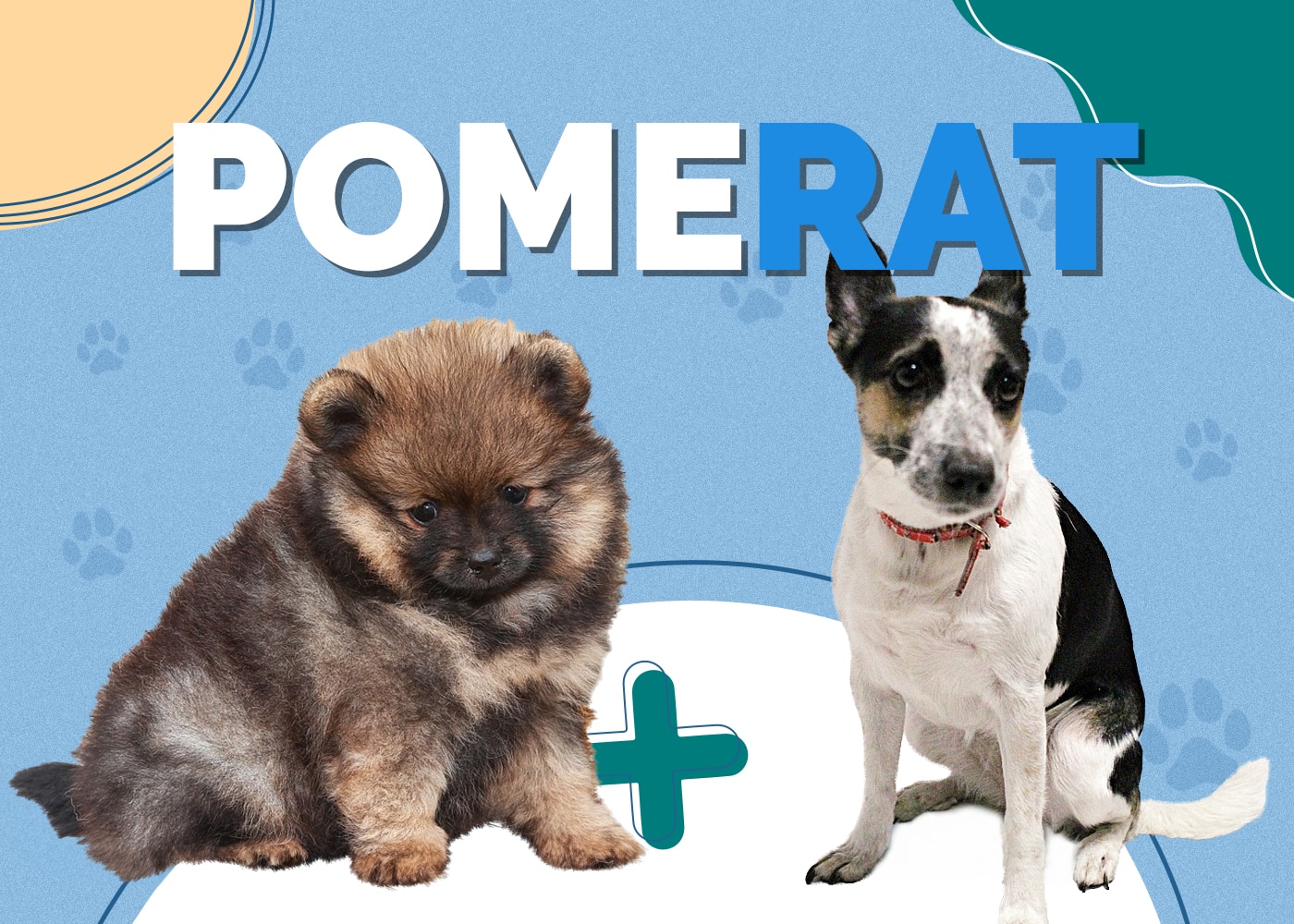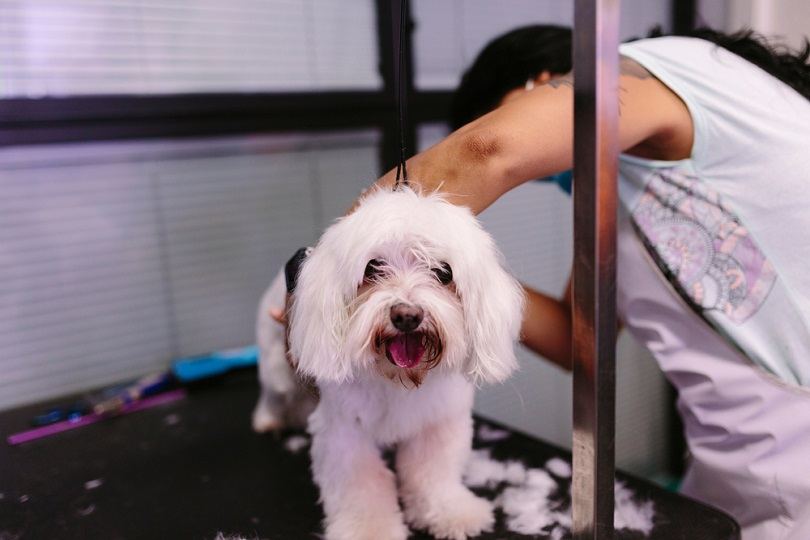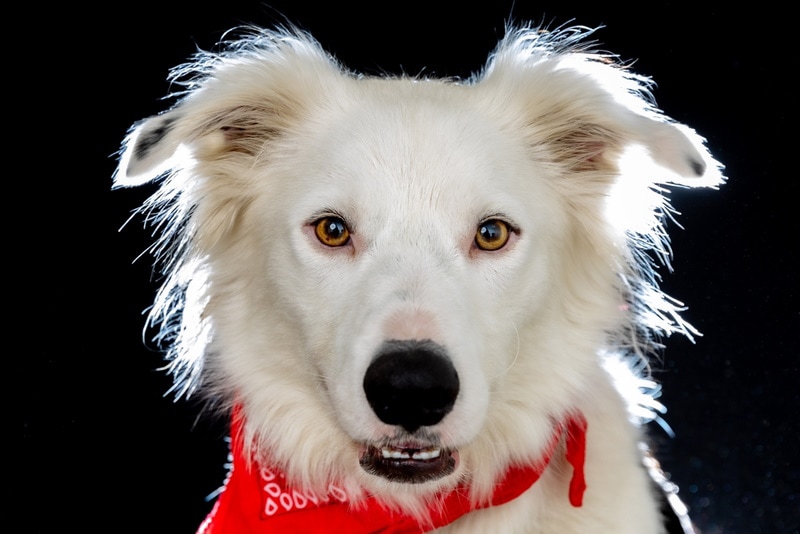Great Bernese (Bernese Mountain Dog & Great Pyrenees Mix): Info, Pictures, Facts

Updated on
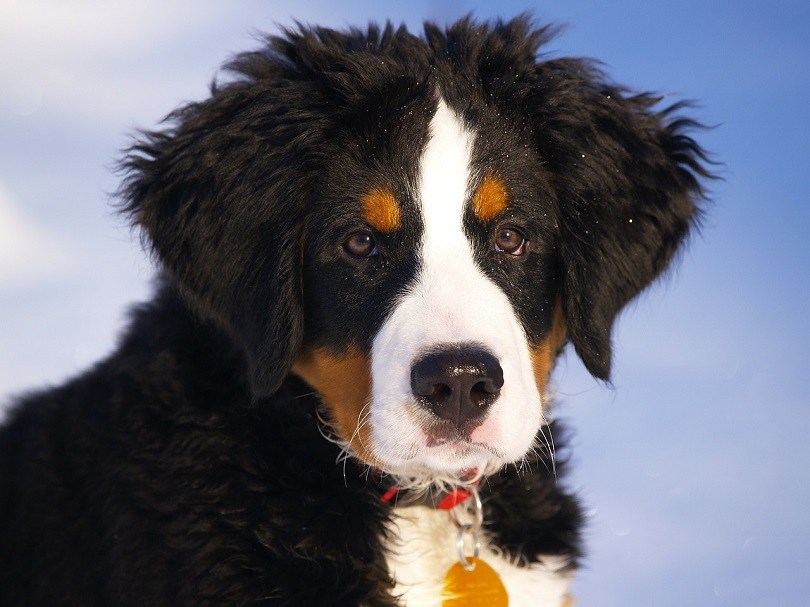
Height:
24 – 28 inches
Weight:
70 – 115 pounds
Lifespan:
8 – 12 years
Colors:
White, black, brown, rust
Suitable for:
Companionship, active families without small children, singles, people with large yards
Temperament:
Calm, loyal, gentle, affectionate, protective, stubborn, playful
If you are looking for a large and lovable pooch to share your home, the Great Bernese could make a great addition to your family. This loyal, affectionate, and playful pup is known for its fierce protectiveness and loyalty to their family.
Bred from a Bernese Mountain Dog and a Great Pyrenese, this designer breed has many great qualities that make it the perfect companion for a single individual or a family with lots of room to jump and play. That being said, even if you have lots of space and time to devote is this type of dog, you still want to make sure to do your due diligence in researching the canine of your choice.
In the article below, we will give you all the details you need to make an informed decision about the Great Bernese. We will talk about their appearance, health, temperament, and much more. We will also share whether this dog will be right for you.
Great Bernese Puppies
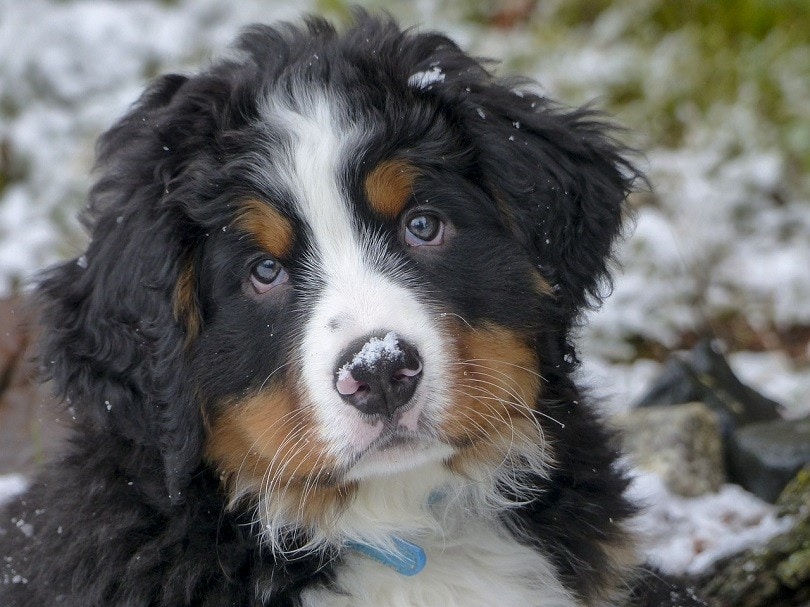
As mentioned, the Great Bernese is bred from the Bernese Mountain Dog and the Great Pyrenese. Both parents are from working-class families and have long, distinguished lines. The Bernese Mountain Dog, for example, comes from Switzerland where they worked on farms for centuries.
On the other hand, the Great Pyrenese is thought to have originated in Asia or Siberia but has been used as a herding dog in Europe since the Bronze Age. Both breeds are recognized by the American Kennel Club, although their offspring have not yet had that distinction, even though they have been bred since the mid-1900s.
As puppies, the Great Bernese can exhibit qualities and traits from both of their parents. They are generally playful, affectionate, and even a bit clumsy at times before they grow into their large paws. These puppies should also be trained at an early age as they can be quite stubborn and independent. Although they are not lacking in intelligence, establishing a firm hand from the onset is essential.
3 Little-Known Facts About the Great Bernese
1. The Great Bernese Has Royal Ties
This dog’s ancestors have some swanky associates. The Great Pyrenees was used as a guard dog to the royal family and elite members of the Court in France for decades.
2. True Companions
The Great Bernese makes one of the best canine companions. They typically will relate to one member of the household and devote all of their love and attention to this person. This makes them a great option for a single person as they will thrive in this environment.
3. Eyes and Nose
Even though the Great Bernese is bread from two entirely different parent breeds, this pup will only have brown eyes and a black nose.
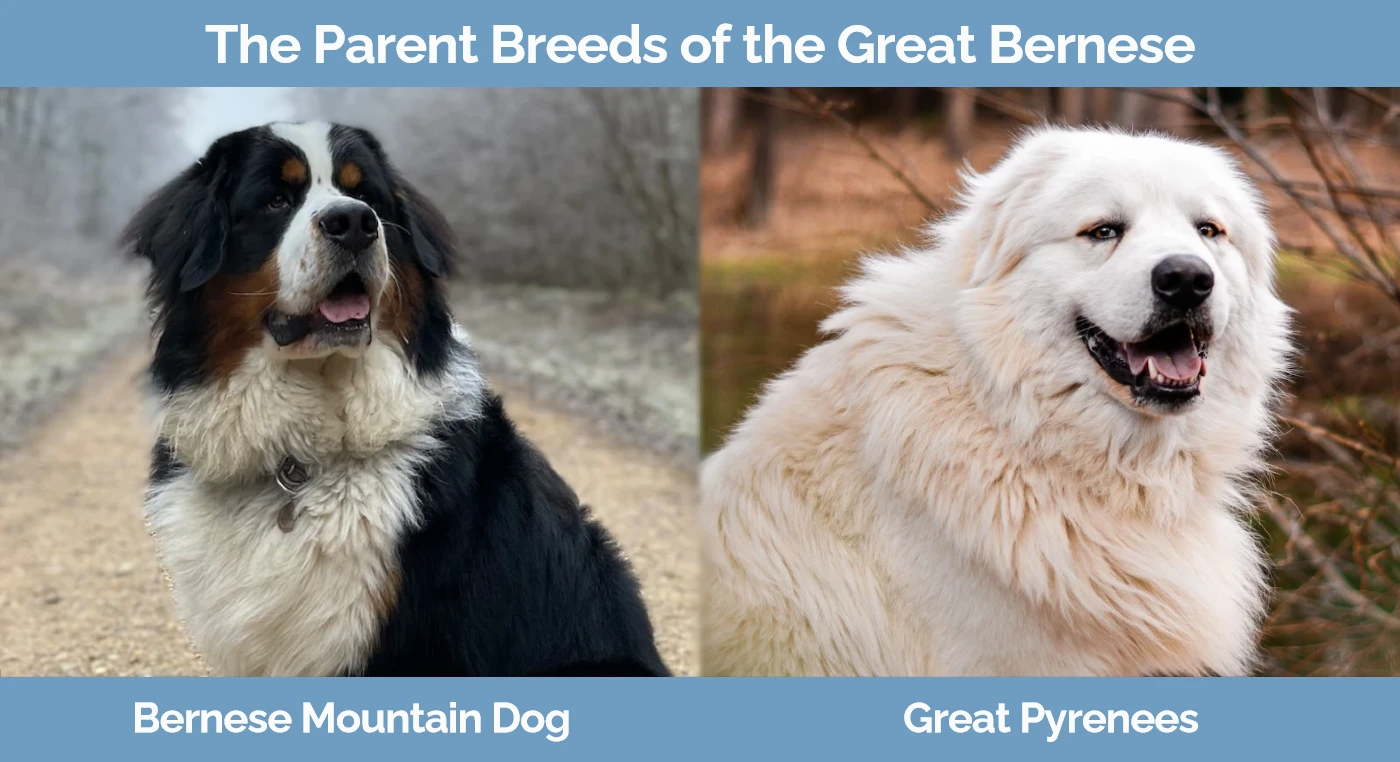
Temperament & Intelligence of the Great Bernese 🧠
The Great Bernese is an intelligent, loving, and loyal dog. They tend to be calm and stoic, yet they can romp about with the best of them. This breed is fiercely loyal and protective, as well. As their ancestors have been used as guard dogs, your pup will have no problem letting suspicious individuals know they are not welcome. That being said, the Great Bernese is rarely aggressive.
Something interesting to note about the Great Pyrenees Bernese Mountain Dog is that they tend to pick out one family member to devote themselves to. In this case, they will spend a lot of time trying to elect pats and attention from that one person. On the other hand, they are still a good family dog if they can create bonds with other members of the household, too.
Some of the traits you will find in this pooch are as follows:
- Loyal
- Happy
- Affectionate
- Independent
- Calm
- Stubborn
- Intelligent
- Protective
- Stoic
- Gentle
- Playful
As mentioned, this is a very intelligent breed, but they can have a stubborn streak. This can cause some difficulty while training, although we will go over that in more detail in a little bit.
Are These Dogs Good for Families? 🏡
These gentle, affectionate, and playful dogs are great for families, as well as, one-person homes. You should note, however, that because of the Great Pyrenees Bernese Mountain Dog’s size, small children should always be monitored with this pet. In fact, this breed typically does better with older children, as they are less restricted in play.
Be that as it may, the Great Bernese makes a wonderful guard dog for the entire family. Even though they might show more affection to one individual, they are still loyal to the entire home and will protect it as needed.
Does This Breed Get Along With Other Pets? 🐶 😽
Due to their calm nature, Great Bernese does well with other pets. Of course, this can all depend on their initial training and upbringing. As guard dogs, the Great Bernese can be wary of new faces including other pets. They may not be aggressive towards them, but they will show some standoffishness and a reserved manner.
Socializing your dog at a young age can make a big difference if you plan to have other pets in the home. The Great Pyrenees Bernese Mountain Dog tends not to be jealous or overly rambunctious, so, for the most part, they will get along well with other dogs and cats. Keep in mind, however, they have been known to herd due to their parentage.
Things to Know When Owning a Great Bernese:
Now that we have gone over the Great Bernese’s temperament, personality, and puppy years, there are still many areas that you will need details on such as their diet, training, health, and exercise. Not only that, but thanks to their long and shaggy coat, grooming is also an area where you will need some additional info, which we have provided below.

Food & Diet Requirements 🦴
The Great Bernese does not have any dietary restrictions that are outside of the norm. Be that as it may, like any other dog, they require a nutritious diet that has a good balance of protein, fat, and fiber. Not only that, but you should also supply your pet with other nutrients that will strengthen their overall health.
Some good ingredients you should keep an eye out for are things like antioxidants, which will help their fur and skin. As this dog has a thick coat of fur, keeping it shiny and healthy is important. Also, probiotics and prebiotics are good for their digestion. Finally, supplements such as glucosamine are important as this breed is prone to joint pain and discomfort as they age.
Overall, you should provide your Great Pyrenees Bernese Mountain Dog with healthy foods that have lean proteins and other nutritious ingredients. You can choose whether you want to feed them a store-bought dry food, raw or freeze-dried meals, or you can make them homemade dinners. The most important thing to note, however, is that this large pup will consume a generous amount of chow.
The Great Bernese should get at least four cups of food per day spread out between morning and night. This can get expensive. Feeding one Great Bernese for a month will cost just under $100. You should keep this in mind when you are figuring out your overall budget for taking care of this pet.
We also wanted to mention treats. The Great Bernese is predisposed to weight gain so feeding them healthy treats is imperative for their overall well-being. Keep table scraps and other unhealthy snacks to a minimum. Instead, try giving them organic or all-natural products along with fruit.
Exercise 🐕
The Great Bernese is a fairly active dog that requires daily exercise. Due to their size, they are at home in large yards or other open spaces where they can run, chase, and frolic freely. This breed also fares better in cooler climates because of their thick coat.
Rural or suburban settings are best for this pup as there will be more opportunities for exercise. Although they do not mind lazing about the house, they much prefer going on long hikes or walks on the beach.
This type of dog can also have a great time socializing with other pets. If your Great Bernese is comfortable with other animals, bringing them to the dog park can also be a great form of exercise as they can rub tails with other canines.

Training 🦮
Training is where things can get a bit sticky with the Great Bernese. They are a very intelligent breed, so catching on to the lessons is not usually the problem. Instead, they can have a stubborn streak and independent nature that will require a firm hand to lead. It is also worth noting that this dog is extremely protective and will act on these instincts before listening to your commands if they feel something is amiss.
We recommend starting housebreaking, command training, and obedience school as early as possible in your dog’s puppy months. As a general rule, the Great Bernese looks for the “leader of the pack” to follow. Consistency is important.
Unfortunately, the Great Pyrenees Bernese Mountain Dog will require a lot of patience when training. That being said, consistency coupled with positive reinforcement can go a long way as long as you stay committed to the overall goal. As mentioned, this is not an unintelligent breed.
Grooming ✂️
The Great Bernese has long, straight, and thick fur. They also have a very dense undercoat that will need to be taken care of, as well. This is a breed that sheds a good deal especially during the change of seasons. Brushing them daily can help reduce the shedding, but more importantly, it can keep mats at bay which are easily formed in their thick hair.
On the other hand, your pup will not require frequent baths. As their thick coat can be difficult to dry, they should be kept to an occasional occurrence when they really need it. On the other hand, dental health is a bigger concern. This canine is prone to plaque and tartar buildup, so you will need to brush their teeth daily. Dental treats and mouthwashes are also a good idea, along with regular visits to your vet for cleanings.
Besides that, normal grooming aspects of canine care is required. Their nails should be clipped bi-monthly, and their ears checked and cleaned about once a week. You should also keep their ears and eyes clear of excess fur, although you do not need to shave or cut your pet’s coat.
Health and Conditions ❤️
As a designer breed, the Great Bernese are predisposed to conditions that may have afflicted both parents. Although some of these conditions can be serious, proper care, exercise, and diet can keep the risk of these illnesses low.
- Fur mats and skin infections
- Ear infections
- Cavities
- Kidney problems
- Cerebellar abiotrophy
- Bloating
- Histiocytosis
- Addison’s disease
- Meningitis
- Joint conditions
- Epilepsy
- Cataracts
- Obesity
You should also note that due to their heavy coats, this pup can become overheated in warmer climates. Like any animal, regular check-ups by your veterinarian are recommended to ensure your pet is happy and healthy.
Male vs. Female
Like most animals, there can be some distinct differences between male and female Great Bernese. When it comes to the Great Bernese, some of the biggest differences have to do with their size. Females tend to be shorter and typically will not get bigger than 90-pounds.
When it comes to their temperament, the differences can have a lot to do with whether or not your pet has been spayed or neutered. For example, females that have not been spayed can be more stoic and standoffish compared to their male counterparts. Also, males tend to be more affectionate toward the person they have chosen as their companion.
It is important to note that other factors can come into play that will affect your Great Pyrenees Bernese Mountain Dog’s overall personality and behavior. Early handling, training, diet, and living conditions can play a role in your dog’s temperament and traits. Although you may find some very affectionate females and some males that are more standoffish, it can all depend on the individual.

Final Thoughts
Overall, the Great Bernese is a wonderful pet to have. They are loyal, intelligent, affectionate, and playful. They will do well in a single-person household, as well as, homes with children and other pets. As long as you have room for them to exercise and play, a Great Bernese should fit right into your lifestyle.
That being said, you want to keep a few things in mind such as grooming and training a Great Bernese. These are the two areas that can be a little bit more demanding. If this is something that you are confident you can handle with ease, the Great Bernese will make a wonderful companion.
Featured Image Credit: ArtTower, Pixabay


